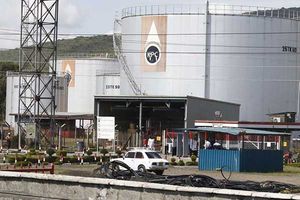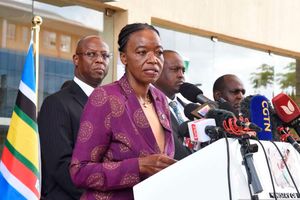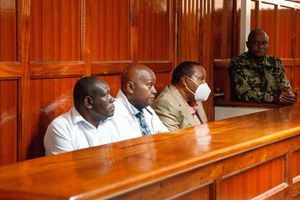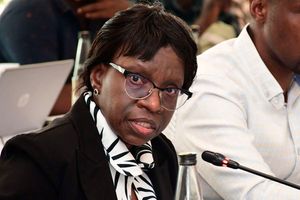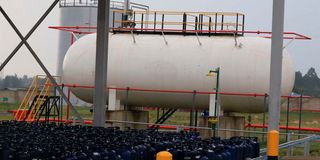
An LPG gas refilling area at Vivo Energy Kenya depot in Nanyuki Town on August 12, 2020. The depot has a capacity of 11.5 million litres of petroleum storage terminals and serves the region and the northern part of the country.
A forensic investigation into the bank accounts of suspects linked to the theft of lubricants worth over Sh226 million from Vivo Energy Ltd helped unravel the intricate web of financial transactions that followed the looting.
The investigation into this money trail was launched after Vivo Energy, formerly Kenya Shell, reported big fraud involving the theft of lubricants during transit from its depots in Mombasa and Nairobi between June 2010 and March 2013.
Following intensive investigations, several individuals, including drivers of a transport company and Vivo Energy staff responsible for dispatch and receipt, were charged with theft of goods while in transit during the specified period.
The accused include Joseph Kiema, Japheth Omboko, Fredrick Ochieng, Zuberi Raloo, Peter Nyoike, Gordon Ngatia Muriuki, Robert Kibet, David Kipkurui, among others.
They are accused of stealing assorted lubricants worth millions of shillings from Vivo Energy Ltd. Some also face alternative charges of compounding felonies, with the prosecution alleging that the suspects, jointly with others, received money upon an understanding that they would conceal the offence of stealing goods in transit.
The accused have, however, denied all charges against them. They were among the scores of people arrested over theft of lubricants worth over Sh226 million between June 2010 and March 2013.
Gideon Wamocha, a retired police officer who previously served in the Economic and Commercial Crimes Investigations Unit, provided detailed testimony on the scope of the investigations he conducted, revealing how the stolen money moved from one suspect to another.
Mr Wamocha told Mombasa Chief Magistrate Alex Ithuku on Wednesday that he was part of a specialised team of four investigators appointed on December 17, 2013 to take over the case from an earlier team that had made significant progress.
Upon assuming control, the team took over police exhibits related to four investigative files containing charge sheets for various suspects.
"The matter we were investigating involved both fraud and the physical theft of products in transit. As a result, the investigation primarily relied on documentary evidence, which is now presented as exhibits," he told the court while being guided by State Counsel Martin Mbote.
He said the team visited Mombasa, Malindi, and Nairobi to conduct interviews, collect and evaluate evidence, and execute search warrants.
Search warrant
On January 14, 2014, the team obtained a search warrant in Mombasa against Mr Raloo, who was then working as a warehouse supervisor at Vivo Energy's terminal depot. Raloo was responsible for stock movement between Mombasa and Nairobi.
During a search of Raloo’s house in Bombolulu, investigators recovered bank documents, which were later analysed alongside those of other suspects to determine whether there were any transactions identifying beneficiaries of the Vivo Energy fraud.
Mr Wamocha subsequently obtained court orders to investigate the specific bank accounts of persons of interest suspected of benefiting from the fraud.
One such account belonged to a Mr Mwangi, covering transactions between January 2010 and February 2014.
"I found that this account received large transfers from an oil firm directly linked to Mr Nyoike. When compared with other suspects’ accounts, there was a pattern of deposits from a bank branch in Nairobi and cash deposits from Mr Mwangi," said Wamocha in a document filed in court.
According to Mr Wamocha, investigators suspected that Mr Mwangi had illicit dealings with the proprietors of the oil firm and that the diverted stocks translated into financial movements between the two accounts.
He further investigated Raloo’s personal bank account for transactions between May 1, 2010 and February 2014.
"The account showed large cash deposits along the Mombasa-Nairobi Highway, where the theft allegedly occurred. Notably, significant funds were deposited from bank branches in Donholm and Mombasa, as well as from a company and Mr Muriuki," he testified.
Further scrutiny revealed that Raloo transferred substantial amounts to Mr Muriuki, his relative, and Mr Omboko.
On October 21, 2014, court documents showed that Raloo’s account had significant cash movements, including huge deposits at bank branches in Mombasa and Donholm.
Substantial cash
He also allegedly made substantial cash withdrawals in Mombasa, Malindi, and Nairobi.
Investigations indicated that on April 27, 2013, Raloo withdrew Sh8.7 million, leaving a nil balance before closing the account shortly after the fraud was uncovered.
"There is no doubt whatsoever that this account was primarily created, used, and closed with the objective of laundering the proceeds of crime," the court heard.
Among the exhibits presented in court were bank transfer documents showing transactions amounting to Sh2.8 million between August 1, 2011 and September 30, 2011.
Court documents show these funds were remitted in favour of Mr Omboko, purportedly for the purchase of a car.
Additionally, a withdrawal slip dated August 27, 2011 indicated that Raloo deposited Sh599,000 into an account belonging to Mr Muriuki.
Furthermore, documents relied on by the prosecution revealed that Mr Raloo received a staggering Sh67 million in cash deposits at bank branches in Donholm and Kisumu Mega City.
Additionally, he received Sh5.6 million and another Sh12 million from Mr Muriuki. The investigation further established that Mr Raloo sent Sh8.6 million to Mr Omboko, Sh2.2 million to a relative, and Sh6.6 million to Mr Muriuki.
The court also heard that a company linked to Mr Muriuki deposited Sh3.7 million into Mr Raloo’s account.
"In comparison to his earnings as an employee of Vivo Energy, he lived far beyond his means, as demonstrated by the analysis of his income between 2010 and 2013," said Mr Wamocha.
The 13 suspects charged in this case will know their fate next month after the Office of the Director of Public Prosecutions (ODPP) closed its case, having presented evidence from at least 18 witnesses.
The court has directed the suspects and the prosecution to file and serve their submissions before a ruling is delivered on whether the accused have a case to answer or not.
Should the court weigh the evidence presented by the prosecution and find it sufficient, all 13 suspects will be required to defend themselves to prove their innocence.
However, should the court find that the prosecution’s evidence is insufficient, all suspects will be acquitted. The case will be mentioned on April 23.

